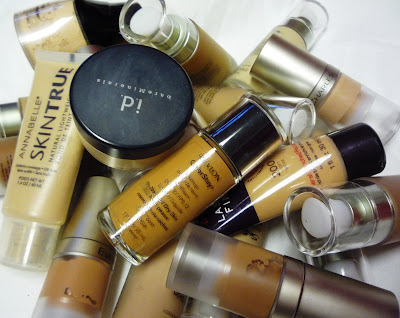Let's face it ladies, trying to find the perfect foundation can be an overwhelming task! With so many different types and shades of foundation out there, it can be difficult to find one that complements your skin type, skin tone and budget! I hope to eliminate some of the confusion that goes along with finding the perfect foundation in this post and the next where I will share with you some tips on finding both your perfect foundation type and the perfect shade of foundation for your skin! This is gonna be a long one so here goes!
Things to consider when shopping for foundation:
1. Your Skin Type: Your skin dictates the actual type of foundation you should choose. Generally speaking, dry skin types should choose foundations with some moisturizing ingredients while oily and acne-prone skin types should choose foundations that are oil-free. I personally feel that there is a liquid foundation for all skin types and I use liquid foundation almost exclusively on my clients. There are, however, many other foundation formulas to chose from. Moisturizing cream foundation can work well for dry skin while oil-free cream or powder foundation can be used for oilier skin types. If you are looking for a more sheer coverage, mineral powder can provide a light-medium coverage for normal to oily skin while drier skin types may prefer tinted moisturizer. If you have combination skin you may want to look for a foundation specifically formulated for this, as they tend to have moisturizing ingredients along with particles to soak up excess oil. Remember, this is only a general overview. If you find that you prefer foundation that isn't necessarily formulated for your specific skin type then use what works the best for you!
2. Your Skin Tone: Wearing foundation with the proper undertone ensures that your foundation looks natural and does the best job at making you look radiant and flawless. Wearing the wrong tone of foundation; however, can make your skin look dull and can bring out the dark circles under your eyes. There are three basic skin tones: warm, neutral, and cool. Warm-toned skins have yellow undertones while cool-toned skins have pink undertones. Neutral skin tones have neither distinct yellow or pink undertones but have a more neutral undertone. An easy way of accessing your skin tone involves looking at the veins on the inside of your wrist. If the veins appear blue then your skin is cool-toned and if the veins appear green then your skin is warm-toned. If you cannot decide whether the veins look distinctly green or blue then chances are you have a neutral skin tone.
3. The Coverage and Finish you want: If you are unsure of the coverage that you want I recommend purchasing a medium coverage foundation that is buildable. That way, if you want a lighter coverage one day you can mix the foundation with your daily moisturizer and if you want a heavier coverage you can apply a second layer of the foundation. Remember: your skin is probably not as bad as you think and the little imperfections that you see are probably not noticeable to anyone else. It is better to look more natural then to have cakey looking makeup that looks like a mask! The foundation finish you want is entirely personal preference. I find that drier skin types tend to prefer a satiny or dewy foundation finish to brighten their skin while oilier skin types tend to prefer a matte finish to combat looking greasy (we always want what we don't have!). I prefer a natural finish foundation, that is, one that is neither too shiny nor completely matte. It looks the most natural because it looks like your skin! How perfect is that!
4. How much money you want to spend: While there are many amazing high end foundations out there (MAC Studio Fix Fluid, Makeup Forever HD foundation, and NARS Sheer Glow, to name a few), it is also possible to find your perfect foundation at the drugstore at a fraction of the cost. Two of my favorite drug store foundations are Revlon Colorstay Foundation and Rimmel Lasting Finish Foundation. In my kit I have a variety of high-end and drugstore foundations but for myself I find myself reaching for drugstore foundations (and why not? With the money I save I can buy another more exciting product too!)
5. Any allergies or sensitivities you may have: For all of you who have acne-prone skin, I feel for you. Products in a foundation that cause breakouts or other reactions can turn an otherwise great foundation into a nightmare! Look out for ingredients such as mineral oil, silica, and corn starch which can clog pores or encourage the growth of bacteria on your face (gross!). Instead, look for the terms oil-free and non-comedogenic (does not clog pores) if you have acne-prone skin or the terms hypoallergenic or allergy-free if you have sensitive skin.
Consider these five tips when shopping for a foundation and hopefully the task will be a little less daunting! Stay tuned for part 2 all about how to find the perfect shade of foundation for your skin!
xoxo, Caitlin



